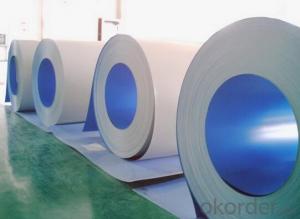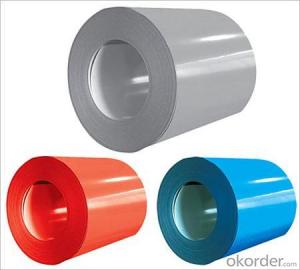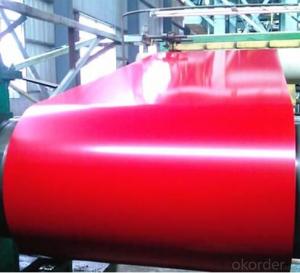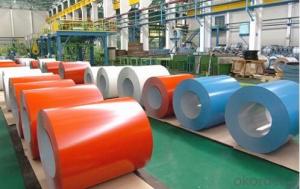PPGI Coils Color Coated Steel Coil RAL9002 White
- Loading Port:
- Tianjin
- Payment Terms:
- TT or LC
- Min Order Qty:
- 30 m.t.
- Supply Capability:
- 10000 m.t./month
OKorder Service Pledge
OKorder Financial Service
You Might Also Like
Item specifice
PPGI Coils Color Coated Steel Coil RAL9002 White
Details of PPGI Coils Color Coated Steel Coil RAL9002 White
Grade | DX51D, SGCC, CGCC |
Thickness | 0.15mm-1.5mm |
Width | 600mm-1500mm(914/1219/1250 are available) |
Standard | JIS G3312, ASTM,GB/T1275 |
Certificate | ISO9001.ISO14001.OHSAS18001 |
Length | As per requests |
Zinc Coating | 40g-275g/m2 |
Lacquer Coated | 20-25 microns/5-15 microns |
Coil ID | 508mm/610mm |
Coil Weight | normally 3-10mt or as your requirement |
Supply ability | 200,000Mt/year (MOQ:25Mt) |
Color | RAL No. |
Price terms | FOB,CFR,CIF |
Payment terms | L/C,T/T |
Deliver time | 30days after received deposit or L/C |
Packing | Standard exporting package |
steel strip Water proof paper, metal covers, | |
Application | Corrugated roofing,outside building, |
boating building,car producing | |
household appliance | |
Main market | Southeast Asia , the EU, Russia, Ukraine , Latin America and other countries and Regions |
Specification of PPGI Coils Color Coated Steel Coil RAL9002 White
Thickness | Width | Length of plate | Inner diameter of coil |
0.18-1.2mm | 800/914/1000/1200/1219/1250mm | 1000-6000mm | 508mm/610mm |
Coated Mass: | |||
Available Coated Mass(g/m^2) | Base plate | Available Coated Mass(g/m^2) | |
60,80, 100, 120, 160, 180 | Galvanized Steel | 60,80, 100, 120, 160, 180 | |
50, 70, 150 | Galvalume Steel | 50, 70, 150 |
Painting | Item | Code | |
Polyester | PE | ||
High-durability polyester | HDP | ||
Silicon modified polyesters | SMP | ||
Polyvinylidene fluoride | PVDF | ||
Easy-Cleaning | — | ||
Painting Thickness | Top side: 20±5microns; | ||
Bottom side: 5~7microns. | |||
Color System | Produce according to RAL Color System or as per buyer’s color sample. | ||
Painting structure | Top surface | Bottom surface |
|
Primer coating | No coating | 1/0 | |
Primer coating | Primer coating | 1/1 | |
Primer coating + Finish coating | No coating | 2/0 | |
Primer coating + Finish coating | Primer coating or single back coating | 2/1 | |
Primer coating + Finish coatin | Primer coating + Finish back coating | 2/2 | |
CNBM Introduction of PPGI Coils Color Coated Steel Coil RAL9002 White
CNBM International Corporation is the most import and export platform of CNBM group(China National Building Material Group Corporation) ,which is a state-owned enterprise, ranked in 270th of Fortune Global 500 in 2015.
With its advantages, CNBM International are mainly concentrate on Cement, Glass, Iron and Steel, Ceramics industries and devotes herself for supplying high quality series of refractories as well as technical consultancies and logistics solution.
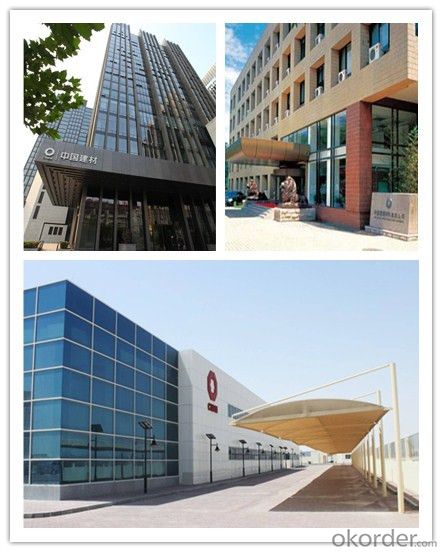
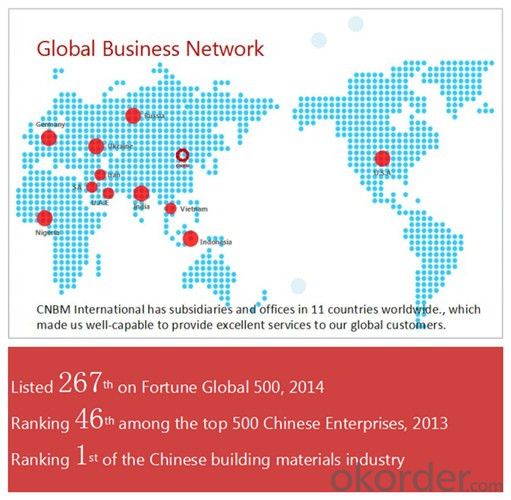
Packaging & Delivery of PPGI Coils Color Coated Steel Coil RAL9002 White
Packaging Detail | Sea worthy packing /as per customer's packing instruction |
Delivery Detail | 15 ~ 40 days after receiving the deposit |
Products Show
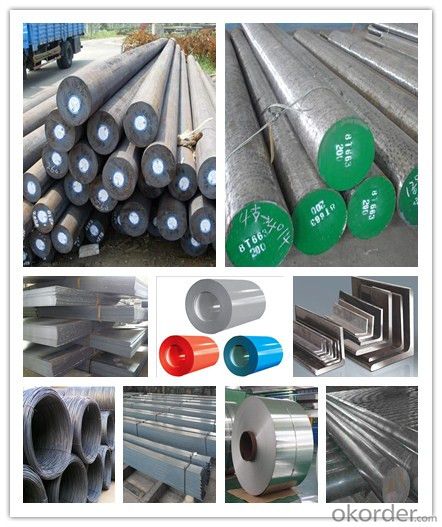
FAQ:
Are you a trading company or manufacturer? | Manufacturer |
What’s the MOQ? | 3 metric ton |
What’s your delivery time? | 15-35 days after downpayment received |
Do you Accept OEM service? | Yes |
what’s your delivery terms? | FOB/CFR/CIF |
What's the Payment Terms? | 30% as deposit,70% before shipment by T/T |
Western Union acceptable for small amount. | |
L/C acceptable for large amount. | |
Scrow ,Paybal,Alipay are also ok | |
Why choose us? | Chose happens because of quality, then price, We can give you both. Additionally, we can also offer professional products inquiry, products knowledge train (for agents), smooth goods delivery, excellent customer solution proposals. |
What's your available port of Shipment? | Main Port, China |
What’s your featured services? | Our service formula: good quality+ good price+ good service=customer's trust
|
Where are your Market? | Covering more than 160 countries in the world |
- Q:How does special steel contribute to the construction machinery industry?
- Special steel contributes to the construction machinery industry by providing high strength and durability to the equipment. This type of steel is designed to withstand extreme conditions, such as heavy loads, vibrations, and harsh environments. It enhances the performance and lifespan of construction machinery, allowing for efficient and reliable operation. Additionally, special steel's unique properties enable the construction of lighter and more robust equipment, leading to improved fuel efficiency and cost-effectiveness.
- Q:What are the applications of special steel in the food processing industry?
- Due to its unique properties and characteristics, special steel finds wide-ranging applications in the food processing industry. One significant use of special steel in this sector is for manufacturing equipment and machinery used in food processing plants. Its corrosion resistance and ability to withstand extreme temperatures make it ideal for frequent sanitization and operation under harsh conditions. Special steel is commonly employed in the production of blades, knives, and cutting tools used in food processing. Its high strength and durability enable these tools to maintain their sharpness and effectiveness even after prolonged use, ensuring efficient and precise cutting of food products. Another application of special steel in the food processing industry is for constructing storage tanks and containers. These tanks are utilized for storing and transporting various food products. The corrosion resistance and hygiene properties of special steel prevent contamination and ensure the quality and safety of the stored food. Moreover, special steel is also utilized in the construction of processing machinery, such as mixers, grinders, and extruders. Its high strength and stability enable these machines to handle the rigorous demands of food processing, ensuring smooth operation and minimizing downtime. Furthermore, special steel often finds application in the production of conveyor systems used in food processing facilities. These conveyors play a crucial role in moving food products along the processing line, and special steel's resistance to wear and tear ensures efficient and reliable operation, reducing the risk of product contamination. In conclusion, special steel plays an extensive and crucial role in the food processing industry. Its unique properties contribute significantly to the efficiency, safety, and quality of food processing operations, from equipment manufacturing to storage and processing machinery construction.
- Q:Are there any disadvantages of using special steel?
- Yes, there are some disadvantages of using special steel. Firstly, special steel is generally more expensive than regular steel. The production process of special steel involves additional alloying elements and heat treatments, which contribute to the higher cost. This can make it less economical for certain applications where cost is a major consideration. Secondly, special steel may have limited availability compared to regular steel. Special steel grades are often produced in smaller quantities and may only be available from specific suppliers. This can lead to longer lead times and difficulties in sourcing the required quantity of special steel, especially for large-scale projects. Additionally, the increased complexity of special steel can make it more difficult to work with. Special steel may require specialized knowledge, skill, and equipment to handle and process. This can lead to higher manufacturing costs and potential production delays if the necessary expertise or resources are not readily available. Furthermore, the high strength and hardness of some special steel grades can make them more prone to brittleness. This means that special steel may be more susceptible to cracking or breaking under certain conditions, especially when subjected to extreme temperatures or sudden impact loads. This can be a drawback in applications that require high toughness or resistance to fracture. Lastly, special steel may have limited applications due to its specific properties. While it offers enhanced characteristics such as corrosion resistance, high temperature resistance, or improved mechanical properties, these advantages may not be relevant or necessary for every application. In such cases, using special steel may be an unnecessary expense without any tangible benefits. In conclusion, special steel has its drawbacks, including higher costs, limited availability, increased complexity, potential brittleness, and limited applicability. Therefore, careful consideration should be given to the specific requirements of the project before opting for special steel.
- Q:How does special steel contribute to reducing maintenance costs?
- Special steel contributes to reducing maintenance costs by offering enhanced durability, corrosion resistance, and wear resistance properties. This means that components made from special steel have a longer lifespan and require less frequent maintenance or replacement. Additionally, special steel can be designed to withstand extreme conditions, reducing the risk of failures and breakdowns, ultimately leading to lower maintenance costs.
- Q:How does special steel contribute to the weldability of products?
- Special steel can contribute to the weldability of products by offering enhanced mechanical properties, such as higher tensile strength and improved toughness. This allows for easier manipulation and deformation during the welding process, resulting in more efficient and reliable welds. Additionally, special steels often have controlled chemical compositions, which minimize the presence of impurities and unwanted elements that can negatively impact weld quality. Overall, the use of special steel in manufacturing promotes better weldability, ensuring stronger and more durable products.
- Q:Can special steel be used for structural applications?
- Yes, special steel can be used for structural applications. Special steel refers to steel that has been alloyed or modified to possess specific properties such as enhanced strength, durability, or corrosion resistance. These qualities make special steel suitable for various structural applications where high performance and reliability are required, such as in the construction of buildings, bridges, and offshore platforms.
- Q:How does the heat treatment process affect the properties of special steel?
- The heat treatment process has a significant impact on the properties of special steel. This process involves heating and cooling the steel in a controlled manner to alter its microstructure and, consequently, its mechanical properties. Firstly, heat treatment can enhance the hardness of special steel. By heating the steel to a specific temperature, followed by rapid cooling, a process known as quenching, the steel undergoes a phase transformation that increases its hardness. This is particularly beneficial for applications that require high strength and wear resistance, such as cutting tools or bearings. Additionally, heat treatment can improve the toughness of special steel. By tempering the quenched steel at a lower temperature, the brittleness caused by the rapid cooling can be reduced, leading to improved toughness and impact resistance. This is crucial for applications where the steel needs to withstand sudden shocks or impacts, such as in automotive or aerospace components. Moreover, heat treatment can also enhance the overall strength of special steel. Through a combination of heating, cooling, and tempering processes, the steel's grain structure can be refined, resulting in improved strength and resistance to deformation. This is particularly important for structural applications, where the steel needs to withstand heavy loads or extreme conditions. Furthermore, the heat treatment process can also influence the corrosion resistance of special steel. By subjecting the steel to specific heat treatment cycles, the formation of certain phases or chemical compounds can be promoted, leading to improved resistance against corrosion or oxidation. This is essential for applications exposed to harsh environments or corrosive substances, such as in marine or chemical industries. In conclusion, the heat treatment process plays a vital role in altering the properties of special steel. By carefully controlling the heating, cooling, and tempering cycles, the hardness, toughness, strength, and corrosion resistance of the steel can be significantly enhanced. This allows for the production of special steel with tailored properties to meet the specific requirements of various industrial applications.
- Q:What is the impact of impurities on the properties of special steel?
- The presence of impurities in special steel can have a significant impact on its properties. Impurities can weaken the steel's structural integrity, reduce its mechanical strength, and compromise its corrosion resistance. High levels of impurities can also affect the steel's ability to be fabricated or shaped into desired forms. Therefore, it is crucial to minimize impurities during the manufacturing process to ensure that special steel maintains its desired properties and performance characteristics.
- Q:How does special steel contribute to the electrical conductivity of products?
- Special steel can contribute to the electrical conductivity of products in several ways. Firstly, special steel alloys can be formulated with specific chemical compositions that enhance their electrical conductivity. For example, adding elements such as copper, silver, or nickel to the steel can increase its electrical conductivity by providing more pathways for the flow of electric current. Additionally, the microstructure of special steel can be manipulated to improve electrical conductivity. By controlling the grain size and orientation of the steel, it is possible to reduce the resistance to the flow of electrons, thereby increasing the overall conductivity of the material. Furthermore, special steel can be heat treated or subjected to other processes to enhance its electrical conductivity. Heat treatment techniques like annealing or tempering can help to remove impurities and improve the crystal structure of the steel, resulting in improved electrical conductivity. Moreover, special steel can also be designed to have low magnetic permeability, which means it exhibits less resistance to the flow of magnetic fields. This property is beneficial for applications where electromagnetic interference needs to be minimized, such as in electrical connectors or transformers. In summary, special steel contributes to the electrical conductivity of products through various means, including chemical composition, microstructural control, heat treatment, and low magnetic permeability. By optimizing these factors, special steel can significantly enhance the performance of electrical components and systems.
- Q:What are the emerging trends in the special steel industry?
- Some emerging trends in the special steel industry include the increasing demand for high-strength and lightweight materials, the growing adoption of advanced manufacturing technologies such as 3D printing, the focus on sustainability and environmental impact reduction, and the rise of electric vehicles driving the need for specialized steel grades. Additionally, there is a shift towards customization and tailored solutions to meet specific industry requirements.
1. Manufacturer Overview |
|
|---|---|
| Location | |
| Year Established | |
| Annual Output Value | |
| Main Markets | |
| Company Certifications | |
2. Manufacturer Certificates |
|
|---|---|
| a) Certification Name | |
| Range | |
| Reference | |
| Validity Period | |
3. Manufacturer Capability |
|
|---|---|
| a)Trade Capacity | |
| Nearest Port | |
| Export Percentage | |
| No.of Employees in Trade Department | |
| Language Spoken: | |
| b)Factory Information | |
| Factory Size: | |
| No. of Production Lines | |
| Contract Manufacturing | |
| Product Price Range | |
Send your message to us
PPGI Coils Color Coated Steel Coil RAL9002 White
- Loading Port:
- Tianjin
- Payment Terms:
- TT or LC
- Min Order Qty:
- 30 m.t.
- Supply Capability:
- 10000 m.t./month
OKorder Service Pledge
OKorder Financial Service
Similar products
New products
Hot products
Related keywords
